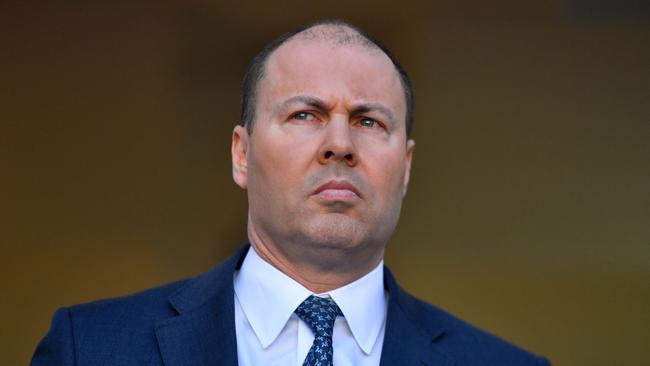Australians can call on financial help to relieve money pressures during the COVID-19 pandemic
Millions of Australians face unemployment and months of financial heartache ahead but there are options out there to get yourself a helping hand.
Business
Don't miss out on the headlines from Business. Followed categories will be added to My News.
Meeting mortgage and rent commitments, paying bills and simply making ends meet are massive concerns for millions of Australians.
As the economic fallout continues to take a stranglehold on the nation’s economy and people’s purse strings, Financial Counselling Australia’s chief executive officer Fiona Guthrie said the first thing anyone should do is ask for help sooner rather than later.
“You have a legal right to ask for financial hardship in all three industries including banks, telcos and utilities,” she said.
“Ring up and ask for a financial hardship arrangement.”
She said regardless of whether you were in a good financial position or not prior to the COVID-19 outbreak, the financial implications of the pandemic could hit people from all walks of life.
“This can happen to anyone,” Ms Guthrie said. “This is going to happen to so many of us during the coronavirus crisis, we are still getting our heads around the enormity of it.
“People should feel comfortable about asking for financial assistance.”
For many Australians who have lived pay cheque to pay cheque without a buffer, they are going to be among those worst hit and will need to urgently call on help.
MORTGAGE/RENT
Many will be asking for a breather from their mortgage repayments if possible, while the details about rent assistance is still to be announced by the Federal Government.

The big four banks are offering from three to six months in mortgage repayment holidays – including a break on regular repayments and servicing interest costs.
But Ms Guthrie said if you are still able to make some small contributions to your mortgage to try and do it.
“Even if it’s only $5 a week do it, pay something because everyone needs to maintain the habits of making payments because it’s harder to get back to that when all of this gets back to normal,” she said.
Many banks have made it clear they will help those who have lost their job or suffered loss of income as a result of COVID-19, so contact your bank directly sooner rather than later and ask for assistance.
St. George Bank’s general manager Ross Miller urged any person concerned about their financial situation to “talk to your bank as early as possible so they are aware of your situation”.
“Majority of financial institutions have easy access to online financial hardship support if you can’t get to a branch,” he said.
“For example, we have options such as deferral options for mortgage holders and tailored hardship assistance to address any other personal debt.”
Mr Miller urged Australians not to hold back reaching out for help.
“Don’t be afraid to have a conversation with your financial institution as soon as possible and be prepared for your discussion with your financial information such as your income and expenses at hand,” he said.
MORE NEWS:
Coronavirus investing: Stocks you need to watch
China’s cover-up: How it hid killer coronavirus
COVID-19’s new immune super race
Who Australia’s coronavirus spreaders really are
SUPERANNUATION
Treasurer Josh Frydenberg has changed the rules around accessing super early, allowing those hit by COVID-19 to tap into their retirement savings prematurely.
Dubbing it the “people’s money” he said the $3 trillion was there to be used in a time of crisis.

Under the scheme, applicants must meet a series of criteria to be eligible.
This includes being unemployed, eligible to received a jobseeker payment, youth allowance for jobseekers, parenting payment or special benefit or farm warehouse allowance.
Also eligible are those Australians who were made redundant or had their working hours reduced by 20 per cent or more this year.
The Australian Institute of Superannuation Trustees’ chief executive officer Eva Scheerlinck said tapping into retirement savings should only be done “as a last resort”.
“AIST is urging Australians who are facing financial hardship to access all other sources of income measures before tapping into their super,” she said.
While the implementation of this measure is still underway, from the middle of next month eligible Australians should be able to apply via the my.gov.au website to access $10,000 from their super accounts, tax-free.
Eligible applicants may also access another $10,000 next financial year, also tax-free.
ACCESS MONEY NOW
The Reserve Bank of Australia’s cash injection for banks to offer Australians low-interest business loans and stimulus packages by the Federal Government has already reached $189 billion.
The Federal Government has rolled out a coronavirus supplement of $550 a fortnight for those who receive payment via Jobseeker.
Previously known as Newstart it has been renamed the Jobseeker Payment which means sole traders and casual workers whose fortnightly income was less than $1075 could be eligible for the full amount.
There is also $750 cash payments, which will automatically be made twice to those eligible. The first payment will be made from March 31 and a second payment will be made at a later date.
For more information on eligibility criteria visit servicesaustralia.gov.au.
There’s a series of rescue packages for small business operators too including cashflow boosts of up to $100,000, reduction of tax payments and cheap business loans.
PLACES TO FIND MORE INFORMATION
There’s plenty of online assistance to help Australians in need.
• business.gov.au
• servicesaustralia.gov.au
• my.gov.au
• moneysmart.gov.au
• australia.gov.au
• dss.gov.au

